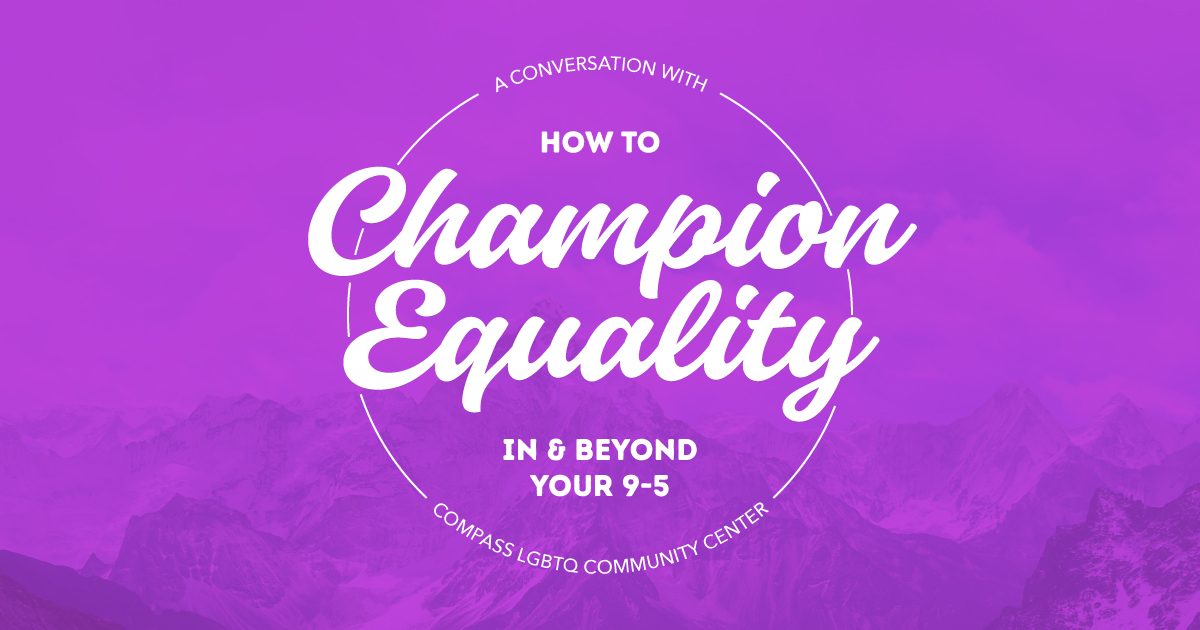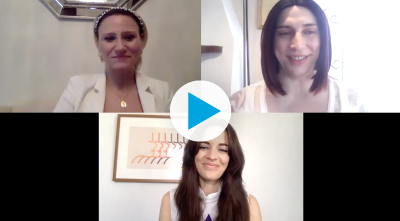Nonprofit Technology & Fundraising Blog
Subscribe to our mailing list
June 26, 2020 |

As Pride Month 2020 draws to a close, we’d like to recognize and celebrate the commitment of the LGBTQ community to equal rights for all. From standing with the Black community to fight for racial justice to working to create safe spaces for important conversations, those who are changing our world through courage and compassion have valuable lessons to share.
We met with Chief Development Officer Julia Murphy and Director of Marketing Michael Riordan from Compass LGBTQ Community Center to learn about how they - both as ambassadors of their nonprofit organization and as individuals - promote equality in their community of Palm Beach County, Florida. Watch the video and see takeaways documented below.

Here are some actions from our conversation that you and your organization can adopt moving forward:
“Education is so important and exposing people to experiences and thoughts that they haven’t been exposed to before is crucial,“ Michael says. Fortunately, there are so many books, websites, videos, social media feeds, and online forums packed with all kinds of information on communities and social causes of all kinds. From eye-opening data to powerful testimonials, the plethora of information that’s available to all of us can direct our steps forward in an informed and purposeful way.
If you’re not sure where to start, consider following a trusted organization’s social media feeds or checking out some of the resources friends and colleagues are sharing on their social media profiles.
You can also simply ask someone you know. “It’s okay as an individual to say, ‘I don’t know. I don’t know about this. I have no experience with this,” Michael advises. “And it’s okay to say it in front of the person that does have experience because then those questions are going to follow and that understanding can come...It starts with recognizing that you don’t know about somebody’s experience, but it’s okay to ask. ...How else will you grow if you can’t admit that?”
Note that you don’t have to go at this alone. There are community-based organizations, houses of worship, libraries, and book stores that host book clubs and documentary discussions on important social issues. Do some searching online! If you’d feel more comfortable learning with people you know and love, start a group with family members, friends, or colleagues.
“It’s important that any leader at a nonprofit or a for-profit recognizes that this will continue to be a challenge and that it’s something you need to continuously work on. It’s not you put one policy in place and this is a solution to a problem,” Julia says.
At Compass, staff members have open dialogue to understand one another’s lived experiences. They don’t always agree on everything, but they do agree on one thing no matter what: listening to one another’s experiences is a critical and constant practice when aiming to grow as a community.
The key to meaningful and productive conversations? Ask questions. “How you can get people to open up is not by telling people what you think but by asking them questions, asking them how they feel, or asking them what they think?” Julia asks. “You learn a lot by just asking questions.”
Michael’s story as a trans woman can teach us how understanding one another’s lived experiences can transform the way we think and challenge us to be more compassionate and aware of our privilege and bias.
She says, “People have their own identity and their own experiences and I think the thing that people forget is that when you’re talking to somebody, they have whole different experiences than you have. And when you experience something and it changes your mind not everybody is going through that with you.”
Speaking of her own story, Michael admits, “As a white male living in the United States, I’ll be honest with you there was a lot of stuff I never had to worry about, never had to think about, and it impacted everything. ...I was 37 years old when I first came out and my experience started to change and some of these things that I had heard from other people but dismissed started to make a lot more sense.”
Compass has had great success in bridging the gap between the LGBTQ community they serve and the community of Palm Beach County as a whole not just through their staff but through allies outside of their organization. “Having allies is the most important piece,” Julia says.
Allies in your community who support your mission play a powerful part in change, as they go back to their social circles and can influence others who may not want to engage with your mission or those you serve. They’re the “connectors” between critics of your mission and your mission itself because people are more likely to listen to friends than strangers when it comes to certain issues.
In addition to its enthusiastic Day 1 supporters, Compass has benefitted from unlikely allies who have been critical to the success of their mission. Through their training program, Compass provides local business owners in Palm Beach County the opportunity to get to know the people at the center of the policies they may or may not support.
“It’s really important that we do trainings for businesses, that we have our transgender staff members go out so they’re taking down that discrimination and that prejudice by seeing somebody and it makes them comfortable. They’re like, ‘Oh well they’re not an alien, they’re not this awful person, right? They’re a human being like me.’”
If your mission isn’t directly tied to social justice but you want to contribute to progress in the area, accomplishing that goal might just be easier than you think. “Look at what your organization entails, while aligning it with other organizations that are in the social justice movement. And there are a lot of ways to do that,“ Julia says.
If your nonprofit is specifically seeking a way to contribute to racial equality, she recommends contacting your local Urban League chapter. The National Urban League’s mission is to “help African-Americans and others in underserved communities achieve their highest true social parity, economic self-reliance, power, and civil rights.” To learn more and connect with your local chapter, check out nul.org.
When conversing with people who have opposing viewpoints to your own, patience most certainly is a virtue. Julia stresses the value of allowing others to mull over your message. “Silence is okay, too. ...If you’re talking to somebody and they take silence to think, that means that they’re processing that. You can’t assume or want a reaction...Not everyone’s on the same page.”
According to Julia, pausing to process isn’t for just one side of a conversation, it’s for everyone. For example, if someone replies to you and you need time, acknowledge that you heard them by saying, “It takes me a little bit of time to process. Give me a moment so I can adapt and understand what you’re saying” or “I’m just listening to you and I may not have a response. I just want to listen right now.’”
“Sometimes people say that it’s not a minority person’s job to educate somebody else on their experience. I have mixed feelings about that because...if that person doesn’t, who’s going to?” Michael asks. “If their experiences aren’t shared, if their perspective isn’t shared, if that explanation isn’t there, where is it going to come from? ...I would much rather control that message and be able to talk to people openly and honestly about the things that impact me and how I exist and who I am to potentially plant those seeds that will grow into better understanding. ...You can’t force people to believe something but you can show people ways to think that maybe they weren’t exposed to before.”
If you’re seeking to support those who have been affected by prejudice, provide a platform for their stories. You can do so by:
Note that not everyone will want to share their personal stories with you, but they’ll certainly appreciate your willingness to learn and do better.
We hope that this conversation was helpful to you and thank you for being part of the change we’re working to create as both individuals and as a whole society, because as Marsha P. Johnson boldly declared, “No pride for some of us without liberation for all of us.”
We’d love to learn from you and your organization. Drop our team member Emily a line at epatz@donorperfect.com with your story or let her know if you’d be interested in connecting over the phone or via Zoom.
Follow us on social!